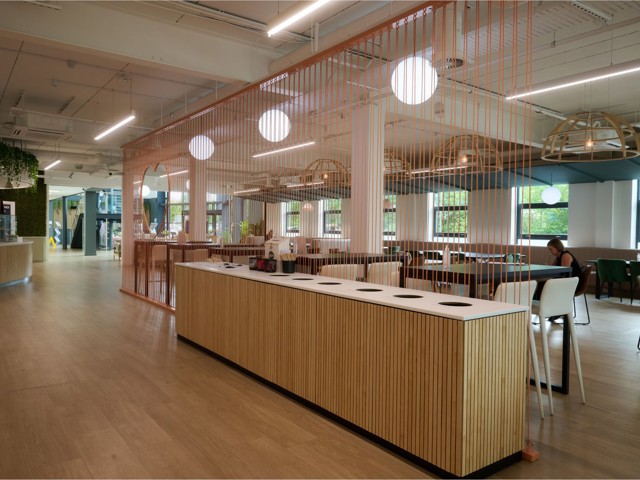
Our determination is reflected in our climate goals which were approved by the Science Based Targets Initiative (SBTi) in November 2024. These include a near-term target to reduce absolute Scope 1 and Scope 2 emissions by 54.6% by FY33, compared to our FY23 baseline.
Understanding the impact of our operations is essential to ensure the initiatives we deploy are effective. So too is improving accuracy when we monitor our utilities, including our use of energy, fuel and water.
In 2025, we again secured ISO 14001 accreditation for the Group. This internationally recognised standard provides a framework for organisations to improve their environmental performance.
Despite this achievement, we continue to face challenges, such as heating large distribution centres and providing low-carbon HGVs when few solutions are available. But we’re trialling new technology where we can.
Achieving Net Zero in our operations
Our longer-term Net Zero goal is to reduce absolute Scope 1 and 2 emissions by 90% before FY50, with only the last 10% being offset or removed. To help get us there, we’re focusing on moving to electric heating in our stores, warehouses and factories; decarbonising our fleet; and improving maintenance and energy efficiency for our sites and vehicles.
Over the past four years, we’ve switched our company car scheme to hybrid and electric vehicles only, fully replacing all petrol and diesel cars. We’ve also introduced hybrid and electric vans for our service managers. To help more colleagues make the switch to electric, we’ve launched a salary sacrifice leasing scheme and are installing more EV charging points across our sites — for our teams, visitors, and even the local community.
To reduce fuel consumption, we’ve continued to see the positive impact of postcode integration and geo-fencing in our logistics planning, which creates more efficient routes for our delivery teams.
We’ve continued to implement our sites’ decarbonisation strategy, linking it to store aquisitions and refurbishments via a “one intervention” approach. In addition to decarbanisation of our heating supplies, we also look to reduce consumption via implementing better insulation and energy efficient lighting where needed. Given our implementation timings, linked to our key trading periods this has meant much of the energy saving we’ve achieved has occurred after the winter peak.
In two of our distribution centres, which are large and hard to keep warm, we’ve undertaken an infrared panel heating trial to ‘heat the humans’ rather than the cavernous space around them. This trial is set to run until after Winter 2025, when a decision will be made regarding the viability of this as a solution for other sites.
We’ve installed more EV charging stations at our sites for colleagues, visitors and the public, offering power at a subsidised rate to increase electric vehicle adoption.
Our operations don’t contribute significantly to the Group’s water use. But we recognise that freshwater is finite and good governance is essential and expected of us.
In FY25, our total water consumption was an estimated 67,352,000 litres.
Our commitments
To minimise water use in our direct operations, we’re focusing on:
Using technology to continually monitor and assess our consumption;
Setting reduction targets when we have a sufficiently robust baseline; and
Encouraging a water-saving mindset among colleagues to drive behaviour change.
Just over half our sites don’t have water meters, with billing based on standing charges and rates. This means we don’t have all the data we would like to help inform our efforts to reduce water use.
As we source water from the wholesale market, we face a number of challenges, including access issues and meters not always being located on our premises.
However, 101 of our 207 sites now have water meters installed, with data regularly supplied to us by our utility management partner.
To report our water use meaningfully, we’ve identified that we need 66% of our estate to be covered by meters. We’re set to trial a new smart monitoring system with a new supplier and will be running this trial in FY26. The ambition of this trial is to prove that real-time data can help us identify anomalies in our consumption to allow us to take targeted action to reduce it.
We’ll use the data to benchmark our efforts, address issues within our control, and collaborate with others where necessary as we continually review initiatives to reduce water use.
Over the past four years, we’ve switched our company car scheme to hybrid and electric vehicles only, fully replacing all petrol and diesel cars. We’ve also introduced hybrid and electric vans for our service managers. To help more colleagues make the switch to electric, we’ve launched a salary sacrifice leasing scheme and are installing more EV charging points across our sites — for our teams, visitors, and even the local community.
To reduce fuel consumption, we’ve continued to see the positive impact of postcode integration and geo-fencing in our logistics planning, which creates more efficient routes for our delivery teams.
We’ve continued to implement our sites’ decarbonisation strategy, linking it to store aquisitions and refurbishments via a “one intervention” approach. In addition to decarbanisation of our heating supplies, we also look to reduce consumption via implementing better insulation and energy efficient lighting where needed. Given our implementation timings, linked to our key trading periods this has meant much of the energy saving we’ve achieved has occurred after the winter peak.
In two of our distribution centres, which are large and hard to keep warm, we’ve undertaken an infrared panel heating trial to ‘heat the humans’ rather than the cavernous space around them. This trial is set to run until after Winter 2025, when a decision will be made regarding the viability of this as a solution for other sites.
We’ve installed more EV charging stations at our sites for colleagues, visitors and the public, offering power at a subsidised rate to increase electric vehicle adoption.
Our operations don’t contribute significantly to the Group’s water use. But we recognise that freshwater is finite and good governance is essential and expected of us.
In FY25, our total water consumption was an estimated 67,352,000 litres.
Our commitments
To minimise water use in our direct operations, we’re focusing on:
Using technology to continually monitor and assess our consumption;
Setting reduction targets when we have a sufficiently robust baseline; and
Encouraging a water-saving mindset among colleagues to drive behaviour change.
Just over half our sites don’t have water meters, with billing based on standing charges and rates. This means we don’t have all the data we would like to help inform our efforts to reduce water use.
As we source water from the wholesale market, we face a number of challenges, including access issues and meters not always being located on our premises.
However, 101 of our 207 sites now have water meters installed, with data regularly supplied to us by our utility management partner.
To report our water use meaningfully, we’ve identified that we need 66% of our estate to be covered by meters. We’re set to trial a new smart monitoring system with a new supplier and will be running this trial in FY26. The ambition of this trial is to prove that real-time data can help us identify anomalies in our consumption to allow us to take targeted action to reduce it.
We’ll use the data to benchmark our efforts, address issues within our control, and collaborate with others where necessary as we continually review initiatives to reduce water use.
| Title | Document |
|---|---|
|
Sustainable Sourcing Policy |
Download document |
|
Biodiversity Policy |
Download document |
|
Group Water Policy |
Download document |
|
Group Leather Policy |
Download document |
|
Group Timber Policy |
Download document |
| Title | Document |
|---|






